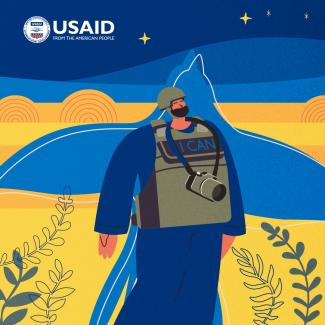Olena, a journalist from Dnipro, documents the trauma of Russia’s continued attacks on her social media accounts.
“Friday, August 16th. Need to get on the train. One after another blasts in the morning. Then they stop…Later I will find out that the enemy destroyed a MIG at the airfield near where I live. Remaining doubts about whether I need the ‘Psychological Support Program for Journalists,’ are dispersing.”
Ukraine’s dedicated war journalists like Olena document Russia’s crimes for the world to see, but this work takes an incredible toll on their mental health. According to USAID partner Kharkiv Press Club, the mental health of frontline journalists has significantly deteriorated since 2023: 82% of journalists reported a worsened psychological state (up from 59% in 2023), and 79% reported sleeping problems (up from 45% in 2023).
USAID supports organizations like Kharkiv Press Club to provide psychological support for journalists working near the front lines. Olena attended one of Kharkiv Press Club’s multi-day rehabilitation sessions in Zakarpattia region, which brought together 12 journalists from nine frontline and border regions with a qualified psychologist to develop tools to be able to deal with the emotions arising from their daily work.
“[The] psychologist taught [us how to] to deal with emotions, so that thoughts do not [affect] other thoughts…Five days of training were so intense that it seems like two weeks have passed. Such psychological recovery programs for the media are extremely necessary!” explained Olena.
Other participants from Kharkiv explained how they would take the tools and techniques learned at the retreat back to their colleagues, including tips on how to ensure that they can get enough sleep.
USAID will continue to support Ukraine’s dedicated war journalists to protect their mental health while they report on the worst of Russia’s aggression against Ukraine.

